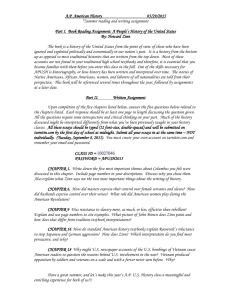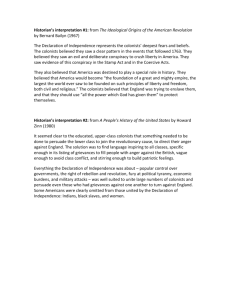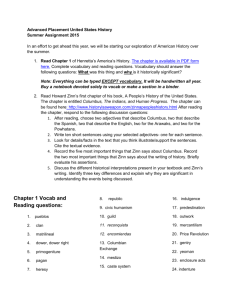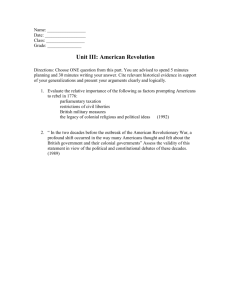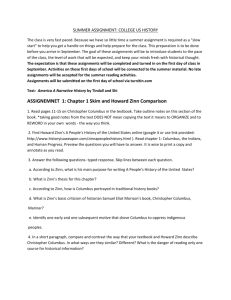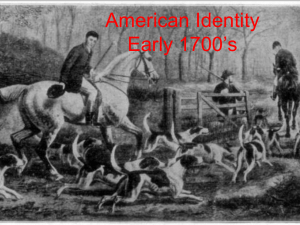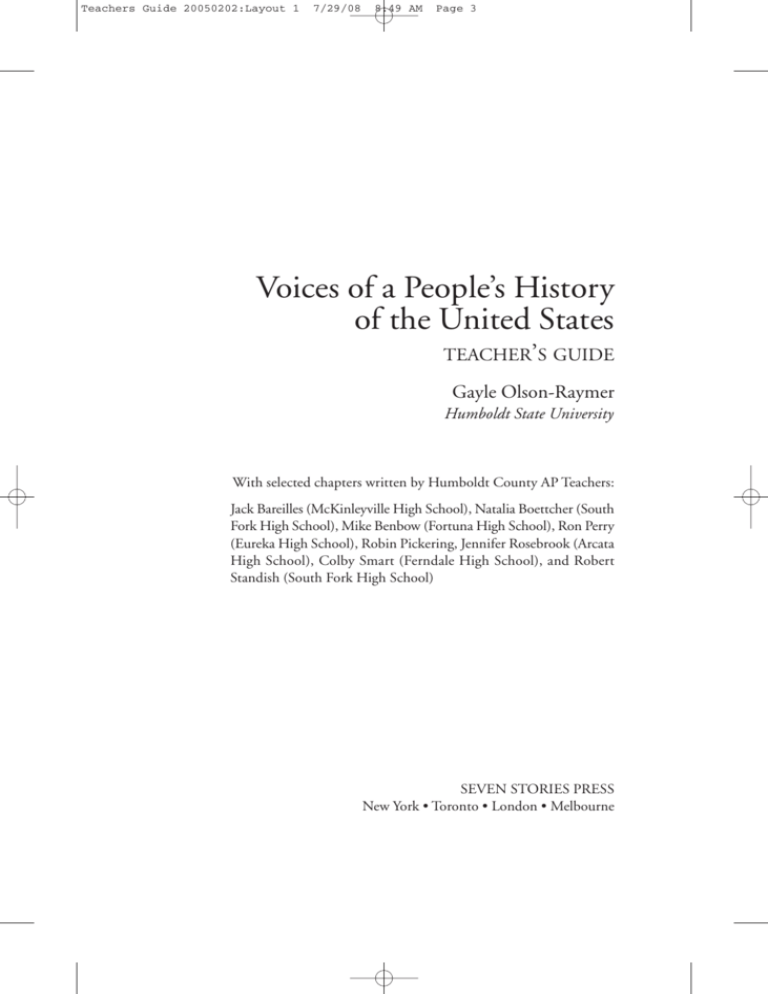
Teachers Guide 20050202:Layout 1
7/29/08
8:49 AM
Page 3
Voices of a People’s History
of the United States
TEACHER’S GUIDE
Gayle Olson-Raymer
Humboldt State University
With selected chapters written by Humboldt County AP Teachers:
Jack Bareilles (McKinleyville High School), Natalia Boettcher (South
Fork High School), Mike Benbow (Fortuna High School), Ron Perry
(Eureka High School), Robin Pickering, Jennifer Rosebrook (Arcata
High School), Colby Smart (Ferndale High School), and Robert
Standish (South Fork High School)
SEVEN STORIES PRESS
New York • Toronto • London • Melbourne
Teachers Guide 20050202:Layout 1
7/29/08
8:49 AM
Page 4
Copyright © by Gayle Olson-Raymer
All rights reserved. No part of this book may be reproduced, stored in a retrieval
system, or transmitted in any form, by any means, including mechanical, digital,
photocopying, recording, or otherwise, without the prior written permission of the
publisher.
Seven Stories Press
Watts Street
New York, NY
www.sevenstories.com
ISBN-:
--- / ISBN-: ----
College professors may order examination copies of all Seven Stories Press titles for
a free six-month trial period. To order, visit www.sevenstories.com/textbook, or fax
on school letterhead to --.
College professors who have adopted Voices of a People’s History of the United States
by Howard Zinn and Anthony Arnove as a course textbook are authorized to
duplicate portions of this guide for their students.
Design by Jon Gilbert
Printed in the U.S.A.
Teachers Guide 20050202:Layout 1
7/29/08
8:49 AM
Page 51
CHAPTER FOUR
Preparing the Revolution
In most of our history courses, students learn about brave patriots who prepared
for the Revolutionary War by uniting against a tyrannical king and oppressive
English laws. In this well-known story, all Americans united in opposition to
England and looked to their enlightened leaders to help them in their valiant struggle for freedom. While there certainly is some truth to this version of the
Revolutionary War, a more balanced interpretation includes another perspective—
that of the many ordinary colonists who had grown increasingly disillusioned and
angry with their unresponsive colonial leaders and did not want to engage in a
war for independence designed to benefit the colonial elite.
Some of those unimportant discontented colonists turned to rebellion against
their colonial governors. In Chapter of A People’s History, Howard Zinn
includes their perspective, weaving it carefully into the more traditional story and
asking questions that must be answered before we can obtain a more accurate
understanding of the years prior to the Revolution. The voices in this chapter give
credence to the beliefs and behaviors of those imbued with the revolutionary
spirit—a spirit full of anger directed at both the colonial elite and the British
Crown.
Document-Based Questions
THOMAS HUTCHINSON
.
Do you think the Bostonians’ reactions to the Stamp Act were treasonous?
Why, or why not? Why do you think England responded by repealing the
Stamp Act rather than arresting the rebellious colonists?
. How does Thomas Hutchinson describe the main grievances of “the mob”
against the Stamp Act? What are his feelings about “the mob”?
. Why do you think the town was “under awe of this mob” with “no body
~ ~
Teachers Guide 20050202:Layout 1
7/29/08
8:49 AM
Page 52
~
daring to oppose, or contradict” it? What does this tell you about the nature
of colonial Bostonian society?
SAMUEL DROWNE’S TESTIMONY
.
Samuel Drowne stated that when the soldiers arrived, most of those gathered were “gentlemen.” Later he stated that those who remained were
sailors “and other persons meanly dressed.” Do you think these descriptions indicate class-consciousness in colonial society? Why, or why not?
. Does Drowne place blame on any group of participants in the Boston
Massacre? How and why?
. Do you think Drowne was a patriot or a loyalist? Support your answer with
direct quotes.
GEORGE HEWES RECALLS THE BOSTON TEA PARTY
.
Why do you think the participants in the Boston Tea Party dressed as
Indians?
. How does Hewes describe his relationship with other participants in the
Boston Tea Party? Do these descriptions, or any others in his recollection,
sound like acts of rebellion? How and why?
. Why is it important to Hewes and his fellow rebels to “render its [tea] entire
destruction inevitable”?
NEW YORK MECHANICS DECLARATION
.
How does the New York Mechanics Declaration compare and contrast with
the Declaration of Independence? What words and concepts are similar?
Dissimilar?
. What do you think the mechanics meant when they accused the King because
he would “take pleasure in our destruction”? What evidence do they offer to
support this belief? Do you agree with their assessment? Why, or why not?
. Do you think the mechanics’ arguments for independence are persuasive?
Why, or why not?
Teachers Guide 20050202:Layout 1
7/29/08
8:49 AM
Page 53
~
THOMAS PAINE
.
Why does Thomas Paine argue against “reconciliation”? Are his arguments
for independence persuasive? How and why? Are they more or less persuasive than those articulated by the New York Mechanics?
. Some historians have called Common Sense one of the greatest early pieces
of political propaganda. What is propaganda? In your opinion, is Common
Sense propagandistic? How and why?
. Do you agree with Paine that British rule “sooner or later must have an
end” (p. )? Why, or why not?
Main Points in Voices, Chapter 4, “Preparing the Revolution”
After reading Chapter in Voices, students should be encouraged to identify what
they believe to be the main points therein. Following are four possible main points.
.
Pre-Revolutionary America witnessed the growth of anti-government
beliefs aimed at both the colonial elite and the British Crown.
. The formal arguments for colonial independence largely focused on
England’s tyrannical and oppressive laws and actions.
. Prior to the eve of the American Revolution, colonial protesters had successfully forced the British Parliament to repeal taxes they believed to be
unfair.
. Only when the King refused to give in to colonial demands did the
colonists turn to war.
Main Points in Voices, Chapter 4, “Preparing the Revolution,”
and in A People’s History, Chapter 4, “Tyranny is Tyranny”
If your students are also reading A People’s History, they should be encouraged to
identify what they believe to be the main points in chapters in both books.
Following are four additional points to be stressed when Voices and A People’s
History are used together.
Teachers Guide 20050202:Layout 1
7/29/08
8:49 AM
Page 54
~
. Tyranny and oppression were tools used by both the colonial and British
elite against the ordinary American colonists.
. By , upper-class colonial politicians realized that they could mobilize
the lower-class energy that had previously been directed against them and
redirect such anger at the British Crown.
. A totally united prewar effort did not materialize among the colonists; significant colonial resistance occurred both before and during the
Revolutionary War.
. Political, economic, and social divisiveness existed in colonial America—
divisiveness that spilled over into the efforts to prepare for war with
England.
General-Discussion Questions for Voices
While the following questions are designed for classroom discussion about all the voices
read in Chapter , they can also be rewritten and included as evaluation tools.
.
Why do you think the English repealed the Stamp Act and removed their
troops from Boston after the massacre? What message do you think these
British actions sent to the colonists?
. The Third Amendment of the Constitution declares, “No Soldier shall, in
time of peace, be quartered in any house, without the consent of the
Owner, nor in time of war, but in a manner to be prescribed by law.” How
do the voices in this chapter help to explain the impetus behind passage of
the Third Amendment?
. Why do you think John Adams, an avowed patriot, defended the British
soldiers who were accused of firing into the crowd at the Boston Massacre?
. What is “taxation without representation”? Do you think the colonists had
a real grievance? How and why? How and why did colonial taxation before
the French and Indian War differ from taxation after that war?
.
What is treason? Do you think the rebellious actions of the colonists
explained in this chapter were treasonous? Why, or why not? If they were treasonous, why do you think the King did not arrest and try them for treason?
Teachers Guide 20050202:Layout 1
7/29/08
8:49 AM
Page 55
~
. Some contemporary historians have described the colonial rebellions as
acts of terror against the British Crown. What is terrorism? Do any of the
voices in this chapter support or refute this assessment? What is your opinion? If American protesters today burned a merchant’s home and papers,
fired upon American soldiers, or destroyed almost one million dollars of a
company’s merchandise, would they be considered terrorists? Why, or why
not?
. Do you think the recollection of events that are recorded years later (such
as George Hewes’ recollection sixty-one years after the Boston Tea Party)
should be considered an accurate account of a historical event? Why, or
why not?
. Do the words of Thomas Paine—especially those directed at “those who
espouse the doctrine of reconciliation”—support or refute Howard Zinn’s
contention that the colonial elite turned the anger of ordinary colonists
against England rather than risk having such anger aimed at them? How and
why?
. How did the voices in this chapter reinforce any of the four themes listed
in “Main Points in Voices”?
. Which of the voices in this chapter did you find most powerful? Least powerful? How and why?
General-Discussion Questions for Voices and
A People’s History
These general-discussion questions are additional questions posed for students
who have read Chapter in both books. For all questions, discussion must focus
on ways the materials in both chapters help students formulate and articulate their
answers.
. What is tyranny? What is oppression? How do these two chapters help you
better understand tyranny and oppression? What is the significance of the
chapter title, “Tyranny is Tyranny”? How do the voices in “Preparing the
Revolution” reinforce the meaning of the chapter title in A People’s History?
. In the first paragraph of “Tyranny is Tyranny,” Howard Zinn makes a case
Teachers Guide 20050202:Layout 1
7/29/08
8:49 AM
Page 56
~
for the argument he posits in both chapters that by diverting anger that
ordinary colonists had focused on the colonial elite to the British Empire,
the “important people in the English colonies . . . could take over land,
profits, and political power from favorites of the British Empire.” Do you
think he proves his case? How and why?
. What was the Proclamation of ? Why did it anger many colonial
Americans? What do you think motivated the Crown to pass such a law?
. Given the voices of discontented colonists and the political and economic
realities of the colonists after the French and Indian War, do you think war
was inevitable? Why, or why not?
. What is a town meeting? What role did it play in the politics of colonial
America? Do you think town meeting politics influenced the course of the
American Revolution? Do town meetings still exist? If so, what role do you
think they play in local politics today?
. What evidence do these chapters provide of class conflict? How does this
information support or refute any of your earlier beliefs about American
colonists?
. Why do you think colonial governors, all of whom lived in eastern cities,
were either slow to respond or unresponsive to the grievances of ordinary
colonists, many of whom lived in the western regions of the growing
colonies?
. What evidence can you find in this chapter that the white urban population in some parts of colonial America was divided? Do you support or
refute Howard Zinn’s contention that the colonial leaders convinced the
evolving middle class to unite with them against “the biggest problem,”
the “propertyless people” (A People’s History, p. )? How and why?
. What does Howard Zinn mean when he says that the “myth of the
Revolution” was that “it was on behalf of a united people” (A People’s
History, p. )? Do you agree or disagree? How and why?
. What were the Coercive Acts? Why did the colonists call them the
Intolerable Acts? What do these two different terms tell you about the divisions between the colonists and the mother country?
Teachers Guide 20050202:Layout 1
7/29/08
8:49 AM
Page 57
~
Evaluation Tools
SUGGESTED ASSIGNMENTS
These assignments can be adapted to meet any classroom need—homework, shortor long-term research projects, individual or group work. The end product should
be flexible, depending on teacher interest and student abilities—papers, journals,
oral reports, visual aides, and the like.
.
The consequences of the French and Indian War are often cited as a primary
cause of the Revolutionary War. Using a search engine of choice, locate
and read at least two documents that support this belief. How do they
demonstrate such support? Are their arguments convincing? Why, or why
not?
. Americans have repeatedly protested the payment of taxes. What were the
primary anti-tax arguments posed by the colonists between and ?
Learn more about at least two other anti-tax movements that occurred in
the United States in the late twentieth century or early twenty-first century.
What were the goals and consequences of each? How do the contemporary
anti-tax movements compare and contrast with those of the colonists?
. Appeasement has long been a controversial foreign-policy option. What is
appeasement? Do you think Parliament’s decision to repeal the Stamp Act
and the Townshend Acts was intended to appease the colonists? Why, or why
not? Provide at least two examples of more contemporary uses of appeasement within the global setting. How does its modern usage compare and
contrast with its usage in colonial America?
. Research the trial of the British soldiers who were involved in the Boston
Massacre. What other accounts support or refute Samuel Drowne’s interpretation? Read John Adam’s defense of the soldiers. What do you think were
his most convincing arguments? Least convincing? Do you agree or disagree with the court’s opinion? How and why?
. Boycotts were a common form of protest prior to the Revolutionary War.
What is a boycott? Which colonial boycotts do you think were most successful? Least? How and why?
. Americans continue to use boycotts to influence domestic and interna-
Teachers Guide 20050202:Layout 1
7/29/08
8:49 AM
Page 58
~
tional policies. Learn more about one late-twentieth and early-twenty-first
century boycott. What were its goals and accomplishments? Would you
have supported this boycott? Why, or why not? Do you think boycotts are
an effective way to protest? How and why?
. Pamphlets such as Common Sense provided the main source of political
information in colonial America. Find and read the contents of another
pamphlet that discusses colonial grievances with the British Crown. How
does it compare and contrast with Paine’s arguments? Which was more
persuasive? Least? How and why?
. In A People’s History, Howard Zinn argues that there is a “long history of
American politics” in which we have seen the “mobilization of lower-class
energy by upper-class politicians, for their own purposes” (p. ). Research
and describe at least two such instances during other periods of American
history. In your opinion, were the “upper-class politicians” successful or
unsuccessful in achieving their goals? How and why? Were these actions comparable to those of the Founding Fathers? How and why?
. Who were Ethan Allen’s Green Mountain rebels? Who were the North
Carolina Regulators? What were their goals and accomplishments? How were
their grievances similar to other anti-government rebels in pre-Revolutionary
America? Locate information about and study one contemporary anti-government group in America. How do the goals and actions of the contemporary group compare and contrast with those of the colonial groups?
SUGGESTED ESSAY QUESTIONS
.
In A People’s History, Howard Zinn asks, “And how could people truly have
equal rights, with stark differences in wealth” (p. )? How would you
answer these questions? How do the voices in “Preparing for Revolution”
inform your answer?
. Support or refute this statement: “[T]he Declaration functioned to mobilize certain groups of Americans, ignoring others. Surely, inspirational language to create secure consensus is still used, in our time, to cover up serious
conflicts of interest in that consensus, and to cover up, also, the omission
of large parts of the human race” (People’s History, p. ).
. Common Sense was one of the most widely read pamphlets in colonial
Teachers Guide 20050202:Layout 1
7/29/08
8:49 AM
Page 59
~
America. In your opinion, what was its appeal? Do you believe that it was
propagandistic? Why, or why not?
. Do you think the Revolutionary War was inevitable? Do you think reconciliation between the colonies and England may have been possible? How
and why?
. Using specifics from Voices (or Voices and A People’s History), support or
refute this statement: “[T]he Founding Fathers . . . created the most effective system of national control devised in modern times, and showed future
generations of leaders the advantages of combining paternalism with command” (People’s History, p. ).
. Many of the rebels discussed in these chapters developed an anti-government bias. What grievances did they share? Do you think their grievances
were valid? How and why? How do their grievances compare and contrast
with such anti-government grievances today?
. What role did impressment, the quartering of British troops, and the publication of Common Sense play in gaining support for independence? Why
do you think that these actions and voices did not convince all Americans
to join the cause?
. What voices of resistance in chapters in both Voices and A People’s History
were of most interest to you? How and why? Which did you find most
compelling and why? Least compelling?
. What does the following phrase from the Declaration of Independence
mean to you? “We hold these truths to be self-evident . . . . That to secure
these rights, Governments are instituted among Men, deriving their just
powers from the consent of the governed. That whenever any Form of
Government becomes destructive of these ends, it is the Right of the People
to alter or to abolish it, and to institute new Government.” Do you think
that the Founding Fathers supported open rebellion at any time the people no longer felt the government upheld their rights or represented their
interests and needs? How and why?
. Do you think the colonial rebellions against the colonial elite—those
described in Chapters and in both Voices and A People’s History—were
justifiable? Why, or why not? Was the rebellion of the colonists against the
English justifiable? Why, or why not? How do the two rebellions compare
Teachers Guide 20050202:Layout 1
7/29/08
8:49 AM
Page 60
~
and contrast? Can you think of any contemporary rebellion that is justified?
Unjustified?
SIMULATIONS AND OTHER CREATIVE APPROACHES
.
Stage a debate in class over the following issue: “In , the actions of the
Founding Fathers were both treasonous and terrorist.” Be certain that both
sides define treason and terrorism—in terms that would be understood by
late-eighteenth-century colonists. When the debate is over, class discussion
should focus on how the terms treason and terrorism are defined today.
Then students should discuss whether the actions of the Founding Fathers
in would be considered acts of treason and terrorism in contemporary
society.
. Hold two town meetings. In the first, students will take the role of colonists
who are deciding whether or not they should join the movement for independence. Prior to holding the meeting, students must select their town,
learn something about its politics, determine the type of people (various
classes, socio-economic background, and so forth) who might attend the
meeting, and be familiar with New England attitudes about independence.
In the second town meeting, students will take the role of contemporary
citizens who are attending a town meeting and are discussing an important
issue that has arisen in their community. Prior to holding the meeting, students must select an issue and investigate both sides of the community
debate.
. Write a letter to King George III in which you explain your position about
a possible war for independence. In your letter, be sure to explain why the
Coercive Acts are known as the Intolerable Acts in the colonies; what you
believe the King’s role to be in the divisions between England and its
colonies; and what you think might be done to avoid war.
. Write a poem or song that illustrates the emotional impact of the title of
Chapter , “Tyranny is Tyranny.”
. Stage a debate about voting in American society. Topics for the debate
should include: Voting is a privilege that is taken for granted in American
society. Voting privileges have only recently been extended to all American
citizens. Voting is both a right and a responsibility. Everyone’s vote matters.
OTHER HOWARD ZINN TITLES AVAILABLE FROM
SEVEN STORIES PRESS
For ordering and course adoption information visit
www.sevenstories.com and www.sevenstories.com/textbook
A Young People’s History of the
United States
Adapted by Rebecca Stefoff
Zinn’s first book for young adults retells U.S.
history from the viewpoints of slaves, workers,
immigrants, women, and Native Americans,
reminding younger readers that America’s true greatness is shaped by our dissident voices, not
our military generals. The single-volume edition also includes side-bar stories of actual children
who made American history, from Anyokah, who helped bring written language to her
Cherokee people, to John Tinker, a high school student who fought all the way to the Supreme
Court for freedom of expression at school—and won.
“In many years of searching, we have not found one history book to recommend . . . until the just
published A Young People’s History of the United States. This is the edition of A People’s History that
we have all been waiting for.”—Deborah Menkart, executive director, Teaching for Change
Volume 1: From Columbus to the Spanish-American War / Paper over board 978-1-58322-759-6 $17.95 224 pages, illustrations throughout
Volume 2: From Class Struggle to the War on Terror / Paper over board 978-1-58322-760-2 $17.95 240 pages, illustrations throughout
-
Paper 978-1-58322-869-2 $19.95 464 pages, 50 b&w, illustrations and photos
Cloth 978-1-58322-886-9 $45.00 464 pages, 50 b&w, illustrations and photos
Voices of a People’s History of the United States
Second Edition
Edited with Anthony Arnove
The companion volume to historian Howard Zinn’s legendary best-selling book
A People’s History of the United States.
“Voices should be on every bookshelf. [It presents] the rich tradition of
struggle in the United States, from the resistance to the conquest of the
Americas in the era of Columbus through the protests today of soldiers and
their families against the brutal invasion and occupation of Iraq.” —Arundhati Roy
“In Voices, Howard Zinn has given us our true story, the ongoing, not-so-secret narrative of race
and class in America.” —Russell Banks
Paper 978-1-58322-628-5 $22.95 672 pages
Readings from Voices of a People’s History
of the United States
Edited by Anthony Arnove and Howard Zinn
Authors Howard Zinn and Anthony Arnove are joined on this audio
CD by Danny Glover, Sarah Jones, Paul Robeson, Jr., Lili Taylor,
Wallace Shawn, and Marisa Tomei to perform rousing words of dissent
selected from the complete anthology.
Audio CD 978-1-58322-752-7 $14.95 45 minutes
Artists in Times of War
Zinn’s essays discuss America’s rich cultural counternarratives to war, from
grassroots pamphlets to the likes of Bob Dylan, Mark Twain,
E. E. Cummings, Thomas Paine, Joseph Heller, and Emma Goldman.
“The essays are all elegantly written and relate history to the great crisis of
current times: war of aggression, western state terrorism, and obedience to
state power under the guise of patriotism.” —Tanweer Akram, Press Action
Open Media Book / Paper 978-1-58322-602-5 $9.95 160 pages
Howard Zinn on History and
Howard Zinn on War
These two companion volumes are handy pocket guides on
the power of history when it is put to the service of the
struggle for human rights, and on the meaning of war in a
world where we have so far proven unable to overcome our
primitive predilection for destroying our neighbor.
On History Paper 978-1-58322-048-1 $12.95 240 pages / On War Paper 978-1-58322-049-8 $12.95 224 pages
Terrorism and War
Edited by Anthony Arnove
Zinn explores how truth, civil liberties, and human rights become the first
casualties of war and examines the long tradition of Americans’ resistance
to US militarism.
“A significant number [of students] say that this and other books from a
radical perspective have transformed their understanding of US society,
politics, and culture.” —Darrell Y. Hamamoto, University of California, Davis
Open Media Book / Paper 978-1-58322-493-9 $9.95 144 pages
The Zinn Reader
Writings on Disobedience and Democracy, 2nd Edition
The definitive collection of Zinn’s writings on the great subjects of our time—
race, class, war, law, means and ends—now updated with thirteen recent
essays.
“A welcome collection of essays and occasional pieces by the dean of radical
American historians.”—Kirkus Reviews
Paper 978-1-58322-870-8 $21.95 752 pages
La otra historia de los Estados Unidos
“Zinn’s work is a classic of revisionist history, bringing forth voices that have
previously been muffled. He lets women, African Americans, workingclass
people, and, yes, Hispanics speak for themselves. This Spanish edition should
prove popular in both public and academic libraries.”
—Library Journal
The first Spanish-language edition of Howard Zinn’s contemporary classic, A People’s History of
the United States.
SIETE CUENTOS EDITORIAL
Paper ISBN 978-1-58322-054-2 $19.95 504 pages
THE ZINN EDUCATION PROJECT
Seven Stories is pleased to support the Zinn Education Project, a collaboration between
Rethinking Schools and Teaching for Change, dedicated to introducing middle school and high
school students to a more accurate, complex, and engaging understanding of United States
history than is found in traditional textbooks and curricula. Visit the web site to see how you
can bring Zinn’s teaching into the classroom, showing students that history is made not by a
few heroic individuals, but by people’s choices and actions. http://www.zinnedproject.org
A People’s History for the Classroom
Bill Bigelow
Activities and projects for middle school and high school classrooms, inspired by Zinn’s A People’s
History. Available from The Zinn Education Project: http://www.zinnedproject.org


